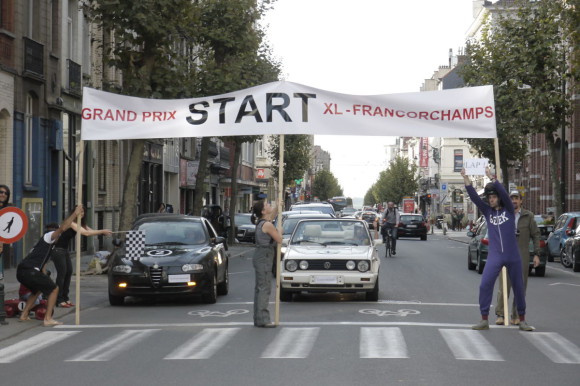
Belgian ECF member GRACQ blocks streets for Formula 1 race
On Friday 19 September 2014 – during Mobility Week – the first Ixelles-Francorchamps Grand Prix took place. Formula 1 racing cars, drivers, mechanics... the road was paved for all motor vehicles on that day. And, by extension, barred to any pedestrians or cyclists who dared venture on this hostile territory. Welcome to the surreal world of one of Brussels’ district, Ixelles/Elsene.
There was surprise on the chaussée de Waterloo road when a banner appeared announcing the “Grand Prix Ixelles-Francorchamps”, along with Formula 1 racing cars and mechanics, while stewards blocked access for pedestrian and cyclists, all to the sound of AC/DC’s “Highway to Hell”. With this ironic action, the Ixelles section of the GRACQ cycle campaign group denounced the outdated “everything by car” policy of the Ixelles commune (one of the 19 local authorities in the Brussels Region).
Pauline de Wouters, head of the Ixelles section of GRACQ, explained: “the aim of this action is to show to the public the true vision of the Ixelles local authority when it comes to mobility policy, which is to encourage journeys by car to the detriment of alternatives.”
While more and more towns and localities in Europe – even in the Brussels Region – are putting genuine plans for sustainable mobility in place, Ixelles seems stuck in the past on this topic. Its policies are reminiscent of the 1950s and 60s when the absolute priority was to cater for growing car traffic.
This old-fashioned approach ignores policies developed by the Brussels regional authorities to encourage high-quality public spaces and active transport modes. Worse still, Ixelles does all it can to block every sustainable transport project proposed by the greater Brussels Region on its territory. Yet these proposals would improve residents’ quality of life as well as traffic conditions for alternative modes of transport.
Ixelles does no better when it comes to 30 kph zones, with the lowest rating of the 19 Brussels local authorities, even though the Brussels mobility plan, called IRIS 2, provides for the extension of 30 kph zones to all local roads in order to make them safer and more convivial for all their users.
This outdated mobility policy is not without consequences for the development of alternatives to individual car use. Cyclists, pedestrians and public transport users all have a rough time in Ixelles, and this does not encourage change in mobility habits.
And yet Ixelles should have every interest in following the good examples from elsewhere in Europe by adopting a transport policy consistent with quality of life for all. A policy that prioritises car journeys creates air pollution, noise and insecurity... all factors with a significant impact on human health.
Watch a short video reporting the action below:
In French, with English subtitles - just click on the options wheel
- Log in to post comments
Contact the author
Recent news!
Upcoming events
Contact Us
Avenue des Arts, 7-8
Postal address: Rue de la Charité, 22
1210 Brussels, Belgium










